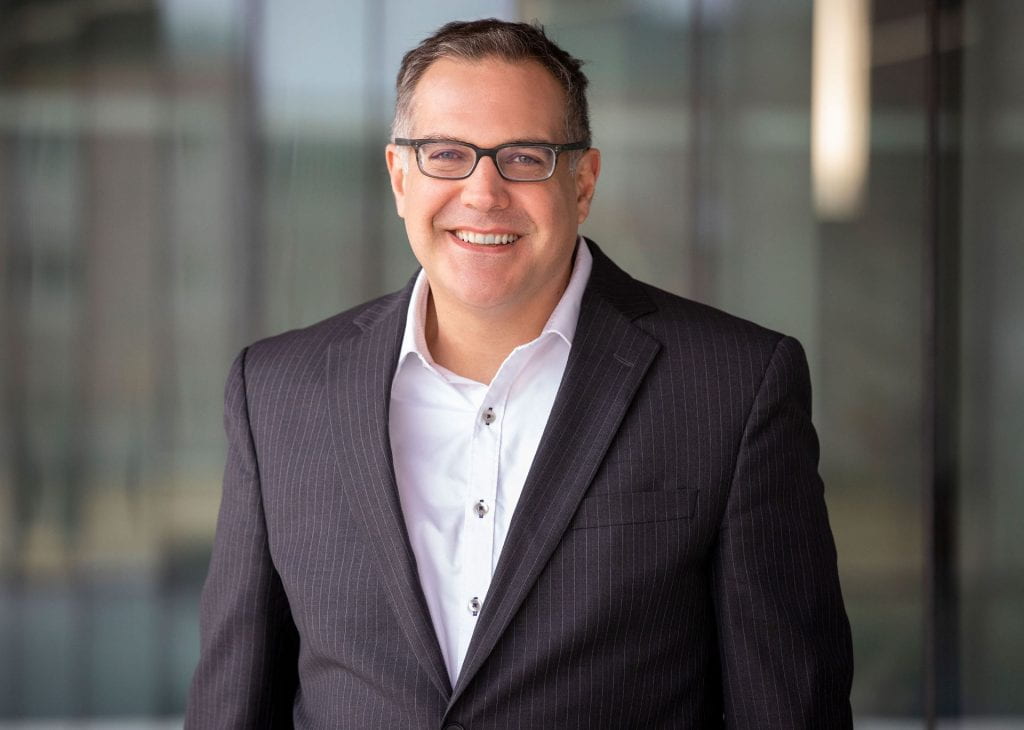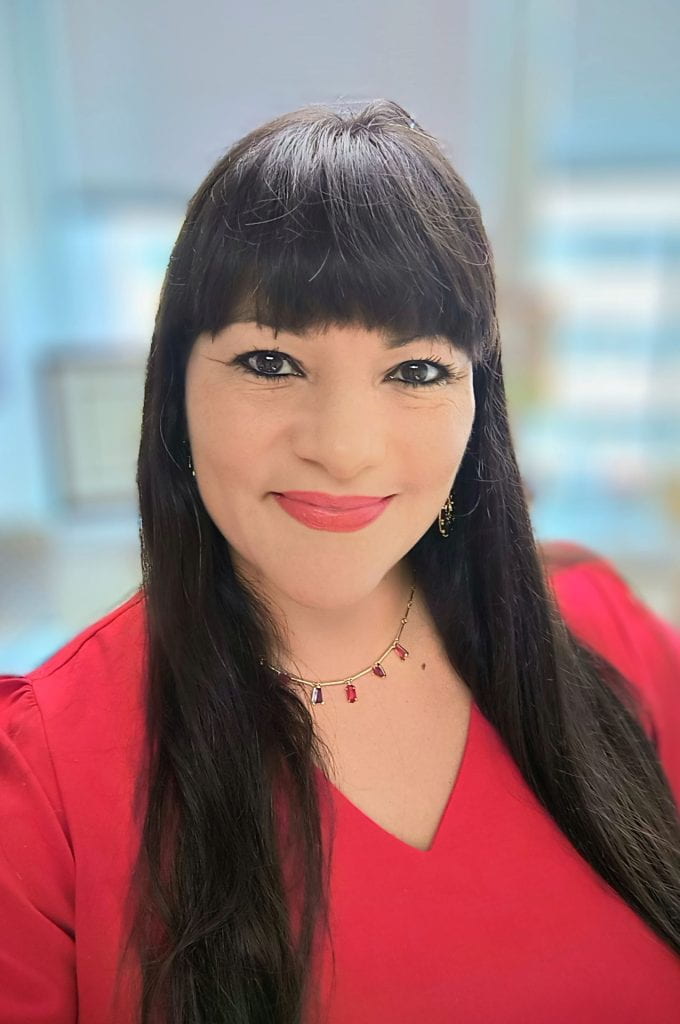National Hispanic Heritage Month is recognized annually from September 15–October 15 by celebrating the histories, cultures, and contributions of Hispanic and Latino Americans. Here we profile two Washington University faculty members and how their Hispanic and Latino backgrounds have helped shape their academic careers and approach to innovation.
Jonathan Silva, PhD: Professor, Department of Biomedical Engineering, McKelvey School of Engineering, Department Director of Diversity
As a professor in the Department of Biomedical Engineering, Jonathan Silva, PhD, is an active mentor, researcher, and advocate for faculty and trainees from diverse groups. And, for over a decade he has led the Silva Lab in developing computational and biological approaches to personalize patient treatments for arrhythmia. Today, he also holds the role of entrepreneur as co-founder and chief technology officer at SentiAR, and more recently Excera, two WashU startup companies that are translating research from his lab to products transforming patient care.

Silva came to entrepreneurship somewhat serendipitously. It was 2015, he had just attended a Microsoft conference and was intrigued by an augmented reality headset featured there, called the Hololens.
He went on to brainstorm the augmented reality concept with his wife, Jennifer Avari Silva, MD, professor of pediatrics, cardiology and biomedical engineering, and director of pediatric electrophysiology at Washington University School of Medicine. Jennifer Silva, as a pediatric cardiac electrophysiologist, agreed that this augmented reality could be valuable for visualizing a patient’s heart during a catheter-based procedure. Excited about the clinical potential, they bought a test headset and within a few weeks a prototype was created.
The months that followed were focused on obtaining grants to continue to fund their research and develop their technology.
It was then that Nichole Mercier, PhD, assistant vice chancellor and managing director for the Office of Technology Management (OTM), who happened to be a guest speaker at Silva’s senior design class, spoke to his students about patents and the benefits of disclosing inventions. Silva realized they needed to connect with OTM about their own technology.
“From that point on, we worked closely with the OTM team and we eventually patented the technology. This was a key turning point for us,” recalls Silva. “It changed what we were doing from solely research to something that could be commercialized.”
From that point on, we worked closely with the OTM team and we eventually patented the technology. This was a key turning point for us. It changed what we were doing from solely research to something that could be commercialized.
Jonathan Silva, PhD
Subsequent steps included working with OTM on identifying funding opportunities, refining their pitch deck, and making connections with the local venture community. Things moved fast and in 2017 SentiAR was founded. Today, SentiAR is commercializing this technology with their first product, CommandEP, a system that utilizes augmented reality to provide real-time 3D holographic images of a patient’s heart to a physician, providing enhanced precision during cardiac ablation procedures.
Silva never anticipated this entrepreneurial turn to his career. Born in Mexico, Silva’s family moved to San Diego when he was five years old. He remembers his parents starting a business and how challenging it was for them. Admittedly, he reasons this was why he didn’t have serious entrepreneurial aspirations during his training and early career. Now, with years of experience developing his own startups, he feels that establishing a company in an academic environment makes all the difference. “There’s help and resources, like the OTM, available to you.”
Today, as the director of diversity for the Department of Biomedical Engineering at McKelvey School of Engineering, Silva oversees a committee of faculty, staff and students working together to ensure members of the biomedical engineering community feel that they belong and are encouraged to participate in all aspects of department and university life. Additionally, Silva is a mentor in the Mentorship to Enhance Diversity in Academia Program (MEDA), helping to foster the careers of trainees who belong to diverse groups with personalized guidance and programming.
Mentoring the next generation of engineers and potential entrepreneurs is a highly valued part of his career and remains personally important to Silva. He leads workshops to prepare faculty for mentoring graduate students and shares his labs own Commitment to Membership, which details seven pledges that characterize the lab’s efforts to mentor its students.
In his role as director of diversity, Silva often hears from students from underrepresented backgrounds articulate how they want to do something really practical with their degree. “I find that they are really interested in starting a company, because it is a practical realization of their hard work, of doing something very tangible with their training.”
Jessica Silva-Fisher, PhD: Assistant Professor, Department of Medicine, Division of Oncology, Assistant Director DEI Oncology, Director of Mentorship to Enhance Diversity in Academia (MEDA) Program
Jessica Silva-Fisher, PhD, is proud to have spent much of her postgraduate career as a trainee at Washington University School of Medicine. Today, she is an assistant professor in the Department of Medicine, Division of Oncology, and a principal investigator studying the functional epigenetic consequences of regulatory RNAs in metastatic cancer with the goal of creating novel therapies. In addition to the research focus of her lab, Silva-Fisher is dedicated to creating a diverse, equitable, and inclusive environment, providing trainees with exceptional scientific training in RNA cancer biology and mentorship.

Although no relation to Jonathan Silva, Silva-Fisher’s scientific career journey similarly hasn’t followed a straight line.
“Growing up, I never thought I would be a scientist,” recalls Silva-Fisher. “It wasn’t until I took a job as clinical trial specimen collector while I was an undergrad. The lab’s PI was a woman, Dr. Linda deGraffenried. She was the first women scientist I had ever met. Immediately I knew this is what I wanted to be. She truly was the role model that I didn’t even know existed. I just followed her path and she remains my role model today.”
Silva-Fisher went on to pursue her doctorate at Mayo Clinic College of Medicine in Biomedical Sciences and then came to WashU for a position with the McDonnell Genome Institute followed by a post-doc fellowship in Christopher Maher’s lab in the Department of Oncology. “Before I worked in the Maher lab, I really hadn’t had any exposure to technology transfer. He knew we needed to disclose and I learned about the process from his mentorship.”
From this experience, Silva-Fisher knows to go directly to OTM early on with her lab’s research. “Today, I talk to my post-docs about the importance of submitting a disclosure form,” stresses Silva-Fisher. “I remind them that before we get our paper out, before we share on social media, we need to disclose.”
Today, I talk to my post-docs about the importance of submitting a disclosure form. I remind them that before we get our paper out, before we share on social media, we need to disclose.
Jessica Silva-Fisher, PhD
Silva-Fisher’s passion for her research is matched by her passion for mentorship and developing programs to support underrepresented minority (URM) trainees. Silva-Fisher attributes her interest in promoting diversity in science to her background growing up in a rich Tex-Mex culture. Raised in a low economic area in San Antonio, her community motto was “Pride in the West Side”. She feels that pride gave her the strength to put herself through college and become the first in her family to graduate with an undergraduate degree and a doctorate degree.
Looking back on her training and early career, Silva-Fisher feels that her sense of pride also kept her from talking about her own success. “Over the years, I’ve learned that self-promotion and self-assessment are important and to embrace what I’ve accomplished. You can be yourself and still be in science.”
At Washington University, Silva-Fisher has found numerous pathways and leadership opportunities to support students with mentorship. As a trainee, she served as chair of a task force on inclusion and cultural awareness within the Department of Medicine. This experience was the spark for developing the Mentorship to Enhance Diversity in Academia (MEDA) program. As founder and director of MEDA, Silva-Fisher helps to develop and promote programming and personalized mentoring opportunities targeted to trainees from diverse backgrounds.
Started within the School of Medicine, the MEDA program has expanded across schools at WashU. Ironically, it was a misdirected email inquiry about MEDA that initially connected Jonathan Silva to Jessica Silva-Fisher. Jonathan Silva was intrigued by the organization’s mission and is now a mentor himself.
Silva-Fisher is excited about MEDA’s growth and looks forward to expanding the program by also serving as the assistant director of DEI in Oncology. “I want to help pave the way for all scientists” reflects Silva-Fisher. “My experiences being Hispanic and a woman drives my passion for engaging underrepresented trainees by relating to their challenges.”
